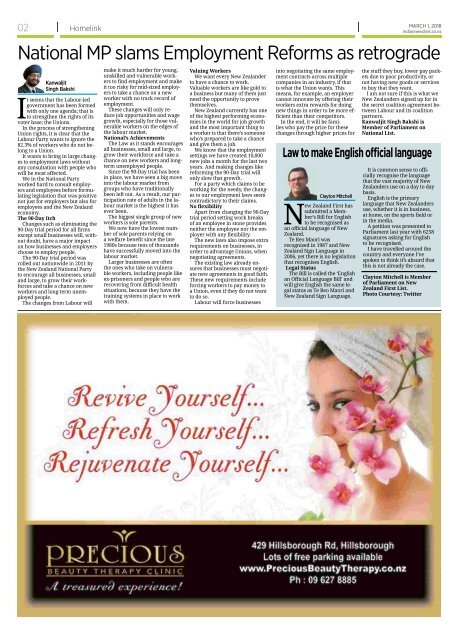You also want an ePaper? Increase the reach of your titles
YUMPU automatically turns print PDFs into web optimized ePapers that Google loves.
MARCH 1, <strong>2018</strong><br />
02 Homelink<br />
National MP slams EmploymentReforms as retrograde<br />
Kanwaljit<br />
Singh Bakshi<br />
Itseems that the Labour-led<br />
government hasbeen formed<br />
with only one agenda; that is<br />
to strengthen the rights ofits<br />
voter base; the Unions.<br />
In the process of strengthening<br />
Union rights, itisclear that the<br />
Labour Party wantstoignore the<br />
82.3% of workers whodonot belong<br />
to aUnion.<br />
It wants to bring in large changes<br />
to employment laws without<br />
any consultationwith people who<br />
will be most affected.<br />
We in the National Party<br />
worked hard toconsult employers<br />
and employees before formulating<br />
legislationthat was positive<br />
notjust for employers but also for<br />
employees and the NewZealand<br />
economy.<br />
The90-Day Itch<br />
Changes such as eliminating the<br />
90-Daytrial period for all firms<br />
exceptsmall businesses will, without<br />
doubt, have amajor impact<br />
on how businesses and employers<br />
choose to employ people.<br />
The 90-Day trial period was<br />
rolled out nationwide in 2011 by<br />
the NewZealand National Party<br />
to encourage all businesses, small<br />
andlarge, to grow their workforces<br />
and take achance on new<br />
workers andlong-term unemployed<br />
people.<br />
The changes from Labour will<br />
makeitmuch harderfor young,<br />
unskilled andvulnerable workers<br />
to find employment and make<br />
it too risky formid-sized employers<br />
to takeachance on anew<br />
worker with notrack recordof<br />
employment.<br />
Thesechanges will only reduce<br />
job opportunities and wage<br />
growth, especially for those vulnerable<br />
workersonthe edges of<br />
the labour market.<br />
National’s Achievements<br />
The Law asitstands encourages<br />
all businesses, small and large,to<br />
grow their workforce and take a<br />
chanceonnew workersand longterm<br />
unemployed people.<br />
Sincethe 90-Day trial has been<br />
in place, wehave seen abig move<br />
into thelabour market from<br />
groups who have traditionally<br />
been left out. As aresult, our participation<br />
rate of adults in thelabour<br />
marketisthe highest it has<br />
ever been.<br />
The biggest single group of new<br />
workers is sole parents.<br />
We now have the lowest number<br />
of sole parentsrelying on<br />
awelfare benefit sincethe late<br />
1980s because tensofthousands<br />
have successfully moved intothe<br />
labourmarket.<br />
Larger businessesare often<br />
the oneswho takeonvulnerable<br />
workers, including people like<br />
ex-prisoners and peoplewho are<br />
recoveringfromdifficult health<br />
situations, because theyhave the<br />
training systems in place to work<br />
with them.<br />
Valuing Workers<br />
We want every New Zealander<br />
to have achance to work.<br />
Valuable workers are likegoldto<br />
abusiness but manyofthem just<br />
needthe opportunity to prove<br />
themselves.<br />
New Zealand currently has one<br />
of the highest performing economies<br />
in theworld for job growth<br />
and the most important thing to<br />
aworker is that there’s someone<br />
who’s prepared to take achance<br />
and give them ajob.<br />
We know that the employment<br />
settings we have created 10,000<br />
new jobs amonth for thelast two<br />
years. And making changes like<br />
reformingthe 90-Day trial will<br />
only slow thatgrowth.<br />
Foraparty whichclaims to be<br />
working for the needy, the changes<br />
to ouremploymentlawsseem<br />
contradictory to their claims.<br />
No flexibility<br />
Apart fromchanging the90-Day<br />
trial period setting work breaks<br />
of an employee in stone provides<br />
neither the employee nor the employer<br />
with any flexibility.<br />
The new lawsalsoimpose extra<br />
requirements on businesses, in<br />
ordertoadvantage Unions, when<br />
negotiating agreements.<br />
The existinglaw already ensures<br />
that businessesmust negotiate<br />
new agreements in good faith.<br />
These new requirements include<br />
forcing workers to paymoneyto<br />
aUnion, even if they do not want<br />
to do so.<br />
Labourwill force businesses<br />
into negotiating the same employment<br />
contracts acrossmultiple<br />
companies in an industry, ifthat<br />
is whatthe Union wants. This<br />
means, for example, anemployer<br />
cannot innovate by offering their<br />
workers extra rewards for doing<br />
new things in order to be more efficient<br />
than their competitors.<br />
In the end, itwill be families<br />
whopay the price for these<br />
changes through higher prices for<br />
the stuff they buy,lowerpay packets<br />
due to poor productivity, or<br />
not having new goodsorservices<br />
to buy that they want.<br />
Iamnot sureifthis is what we<br />
NewZealanders signedupfor in<br />
the secret coalition agreement between<br />
Labour and its coalition<br />
partners.<br />
Kanwaljit Singh Bakshiis<br />
Member ofParliament on<br />
National List.<br />
LawtomakeEnglish official language<br />
Clayton Mitchell<br />
New Zealand First has<br />
submitted aMember’s<br />
Bill forEnglish<br />
to be recognised as<br />
an official languageofNew<br />
Zealand.<br />
Te Reo Maori was<br />
recognised in 1987 and New<br />
Zealand Sign Language in<br />
2006, yetthere is no legislation<br />
that recognises English.<br />
LegalStatus<br />
The Billiscalled the ‘English<br />
an Official Language Bill’ and<br />
will give Englishthe same legal<br />
status as Te ReoMaori and<br />
New Zealand Sign Language.<br />
It is common sense to officially<br />
recognise the language<br />
that the vast majority of New<br />
Zealanders useonaday to day<br />
basis.<br />
English is the primary<br />
language that New Zealanders<br />
use, whether it is in business,<br />
at home, on thesports field or<br />
in the media.<br />
Apetition was presented to<br />
Parliament last year with 6258<br />
signatures asking forEnglish<br />
to be recognised.<br />
Ihave travelled around the<br />
country and everyone I’ve<br />
spoken to think it’sabsurdthat<br />
this is notalready the case.<br />
Clayton Mitchell is Member<br />
of Parliament on New<br />
Zealand First List.<br />
Photo Courtesy: Twitter


















